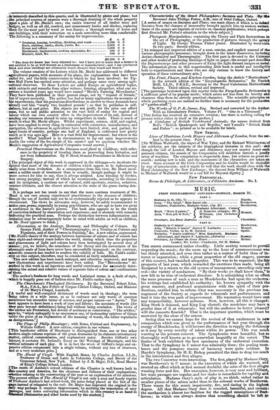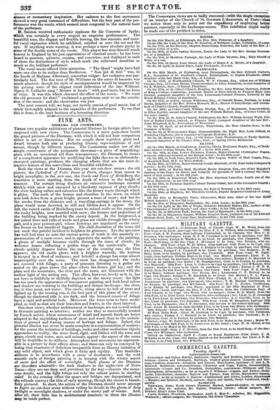MUSIC.
wear PRIIIIARMONIC CONCEET—MONDAT, mason 31.
PAST i.
Sinfonla in D, (No. 7) Haydn. Song, •• The Quail," Miss Rainfurth Beethoven. Concerto, Pianoforte, Madame Oury, (Op. 37) Beethoven.
Madame Albertan', Corno
Recit. " Ecco 11 panto," di Baasetto obligato, Mr. Mozart. Aria, " Non pia di nod." WilliamsPito, (La Ckawaza
di )
Overture, Les Deem Jeurnies Cherubini.
PART Ii.
Sinfonia in C minor Beethoven.
Aria, " Mentre ti laselo" Signor F. Lablache Mozart.
Concerto, Violin, in D, M. SaInton Spohr.
Terzetto, " Soave contort:," Miss Rainforth, Madame
Albanian and Signor F. Lablache, (Zennira) Rossini.
Overture, La Chasse du Jeans Henri Mehul.
Leader, Mr. Loder-Conductor, Sir H. Bishop, THE season commenced rather cloudily. Little anxiety seemed to previil respecting the music; for the room up to the hour of commencement was but thinly attended, and even then rather as a matter of habit than of in- terest or expectation; while a great proportion of the old stagers, patrons of this concert, had-vanished altogether. This was to be expected; the fidr prospects of last year, which rewarded the exertions then made, being all dissipated by a return to the old system of management, amending only one evil—the variety of conductors. " By their works ye shall know them," is now felt to be true of orchestral directors. It is astonishing what an affect the mere presence of such a man as Mendelssohn had upon the orchestra: his writings had established his authority; his known sympathy with the great masters, and profound acquaintance with the spirit of their pro- ductions, enabled him to reform what was necessary in the previous ma- nagement of the Society as regards its rehearsals and performances, Mg lead it into the true path of improvement. His reputation would have Met any responsibility, however arduous. Now, however, all this is changed: King Stork is deposed, and King Log elected; the musicians may have s gentler time of it at rehearsals: but will the audience be better pleased? will the concerti flourish? That is the important question, which must be answered by the close of the season.
Seeing that we cannot hope for the revival of that excitement in neer composition which was given to the performances of' last year through the energy of Mendelssohn, it will become the direction to supply the deficiency as it may by every novelty of talent within its power. This was much wanting at the present concert. The Symphonies were beautiful, but so thoroughly well known as to go somewhat languidly at the outset. The finales of both exhibited the best specimens of the orchestral execution. That to the Symphony in C minor was admirably done; the pealing trom- bones and the pompous masses of harmony were quite sublime. In Haydn's Symphony, Sir H. R. Bishop permitted the time to drag too much in the introduction and first allegro.
The two Concertos were interesting. The first, played by Madame Oury, was 'Beethoven's in C minor; • in the execution of which she warmed, and created an effect which at first seemed doubtful, the solos of the first allegro wanting force and fire. Her execution, however, is very neat and brilliant, her scale passages are regular, and her shake is remarkable for rapidity and articulation. Madame (Jury's style of play is, we think, suited rather to smaller pieces of the saloon order than to the colossal works of Beethoven. There wants for this music impetuosity, fire, and daring in the highest degree. All that Madame Oury does is rounded, beautiful, and certain: the mechanism is almost too faultless for the rugged conceptions of Beet- hoven; in which one always desires that something should be left to
thane or momentary inspiration. Her cadence to the first movement showed a very great command of difficulties; but the best part of the per- formance was the rondo, which seemed most congenial to the natural taste of the performer.
M. Sainton received enthusiastic applause for his Concerto of Spohr; *bich was certainly in every respect an exquisite performance. The beautiful tone, the elegant and flexible bowing, the fine staccato, and taste- ful vocal expression which he exhibited, satisfied at once the ear and the eye. If anything were wanting, it was perhaps a more absolute purity in some of the double notes of the rondo. This player has done himself much honour in England by his just appretiation of classical music: he has been heard in quartets, quintets, sonatas, and concertos; and displayed in each of them the distinctions of style which mark the cultivated musician as much as the brilliant performer. The vocal music offered little attraction. " The Quail" might have had some one else to its author than Beethoven. " Non pia di fiori " was, in the hands of Madame Albertazzi, somewhat vulgar: her recitative was par- ticularly bad. The fine tone of Mr. Williams on the corno di bassetto was much admired; though his style of accompaniment would be improved by his gaining some of the elegant vocal inflections of the late Willman. Signor F. Lablache sang " Mentre ti lascio " with good taste, but no force of voice. It was this which obscured the effect of the music. " We want the old governor for that! " exclaimed a gentleman near us on the conclu- sion of the music: and the observation was just.
The next concert will, we hope, not merely consist of good music, but of music thoroughly adapted to the capacities of the performers. To see that this is done, is the least business of a becoming direction.



























 Previous page
Previous page